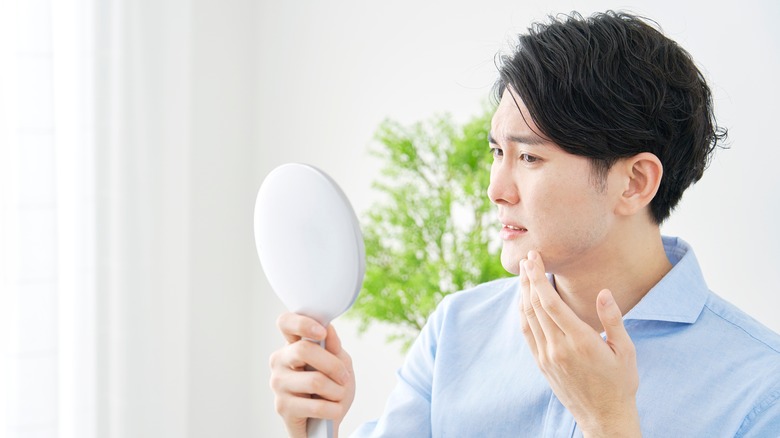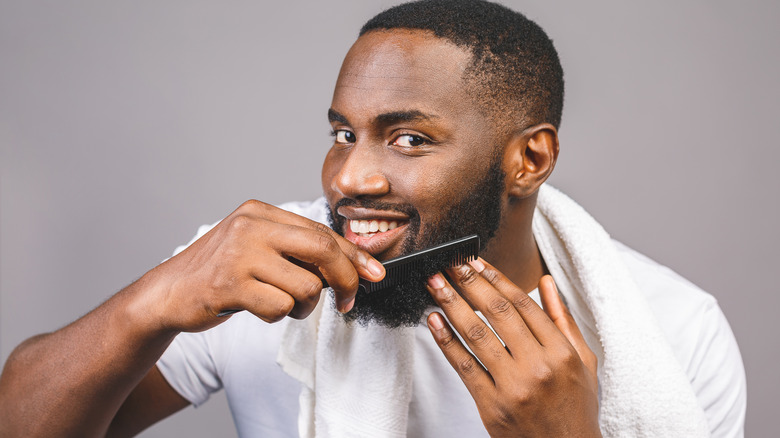What It Really Means When You Can't Grow A Beard
Some people can grow a beard easier than others. Yup, you read that right. We all remember that freshman guy who walked into the high school classroom with that glorious coveted beard. Let's not forget musicians, movie stars, and various other A-list celebrities who rock a beard. While it may come easy for some, many men may find it irritatingly slow or downright impossible to grow facial hair. So then why are we obsessed with facial hair?
According to a study published in Royal Society, men with facial hair are perceived to be more dominant, and some people may view them as more attractive for long-term relationships. In addition, Psychology Today points out that beards boost masculine traits, hide unwanted features, and they allow men to feel more attuned to their masculine side.
Then what happens if you're not able to grow a beard? Does this mean something is wrong with your health? Not exactly, as a number of explanations can account for slow beard growth.
Thank or blame your hair genes
One of the main factors that influence the length and thickness of facial hair is genetics (per Cleveland Clinic). Dr. John Anthony, a dermatologist at the Cleveland Clinic said in a post on the institution's website, that around puberty is when the hair will "transition from fine hair to thick hair, but how thick it is depends on genetics."
In other words, if the men in your family have thick beards, you will probably be able to grow a thick beard as well. This is likely due to the hormone, dihydrotestosterone (DHT), which is responsible for stimulating facial hair growth by binding to the hair follicles (per Healthline). The more sensitive your hair follicles are to DHT, the thicker your beard may grow. This sensitivity to DHT is influenced by your genetics, explains Healthline.
Believe it or not, ethnicity is another factor that plays a role in maximizing beard growth. For example, Healthline points out individuals from Mediterranean countries tend to grow thicker beards compared to others.
Spoiler alert: shaving won't help your beard grow back thicker since it doesn't affect the root of the hair. So if you're needing someone to blame (or thank) for your current beard situation, it's likely your parents or your grandparents.
Age plays a role
Genetics also impact the age you develop a beard. "From ages 18 to 30, most beards continue to develop in thickness and coarseness," Dr. Anthony explains to Cleveland Clinic.
Beard hair grows in stages. Think stubble, growth, more growth, and so on. According to Healthline, there are five stages of typical growth patterns for men and it goes like this: stubble (this stage lasts up to 7 days), growth (which takes about two weeks, so don't be alarmed if some patchiness happens), significant growth (another two weeks), the shaping stage (this is around the one and half month mark so you may want to trim or shape your beard) and the full beard stage (which, after two months of growing out, the process begins to slow). In addition, one 2016 study published in the International Journal of Cosmetic Science reports that facial hair grows between 0.3 and 0.5 millimeters on average during a 24-hour period.
"So if you're 18 and wondering why you don't have a full beard yet, it just may not be time," says Dr. Anthony (via Cleveland Clinic). Besides, if you're noticing young men with full beards, they may just be the exception to the rule. While it is possible to experience full beard growth earlier, Healthline points out that men typically don't experience it until their 30s. If you're younger than that and are unsatisfied, it's likely that as you age, your beard will continue to grow in thickness.
Are testosterone levels a factor?
The idea that testosterone levels cultivate thick or thin beards is a common misconception, points out Healthline. While testosterone supports the growth of facial hair, it is unlikely that your levels are impacting your beard's thickness unless your levels are clinically low.
When men have clinically low testosterone levels, a variety of symptoms can happen. As stated by the American Urology Association, total testosterone levels must drop below 300 nanograms per deciliter for a man to be diagnosed with low testosterone levels. When this happens it can cause erectile dysfunction, mood changes, low sex drive, fatigue, difficulty building muscle, and more, notes Healthline. In some cases, facial hair may be impacted, and little to no facial hair may grow.
Medical News Today points out that certain supplements may support beard growth under a physician's supervision. With this in mind, if you suspect low testosterone levels are to blame, consult with your doctor about ways to treat clinically low testosterone. On the other hand, if you don't have extremely low levels of testosterone, supplementation or diet to boost testosterone is unlikely to have much of an effect on your beard.
Overall health can affect beard growth too
Overall health can play a role in your beard, and it turns out that your beard can serve as a great health clue.
Have you ever noticed a beard with round patches? If so, the culprit here may be a condition called alopecia areata. This autoimmune disorder causes your body to attack hair follicles, which may result in hair loss on the scalp and beard in round patches. According to the National Alopecia Areata Association, the condition affects as many as 6.8 million people in the United States.
Seeing patchiness from alopecia areata may not be easy, but this condition is not dangerous. However, it's unpredictable and may worsen at the drop of the hat, Dr. Anthony tells Cleveland Clinic.
While there is no cure for alopecia areata, there are different treatment options that may help the regrowth process. Medical News Today shares that anti-inflammatory drugs in the form of injections, creams, or ointments can help calm the immune system.
But if your beard is thinning, chances are there may be nutritional gaps in your diet, points out The Healthy. This could be caused from malnutrition, food allergies, or anemia. "If adequate calories aren't consumed, hair growth and maintenance won't be optimized," explains registered dietitian Paul Salter to The Healthy.
Chat with your physician if you're experiencing hair loss anywhere (e.g. face or scalp).
Steps you can take to grow a beard
Eating a nutrient dense diet, while limiting processed and sugary foods is important for overall health. It's also important for maximizing your potential for growing a beard. Healthline shares that prioritizing key nutrients — such as vitamin A, vitamin C, B vitamins, and biotin — may also help support healthy hair growth. Some of these vitamins can be found in leafy greens, eggs, milk, citrus fruits, legumes, and many other foods. Healthline adds that reducing stress and getting enough sleep can also promote beard growth.
However, since a burly beard isn't in everyone's DNA, some men have turned to beard hair implants to support growth. Also known as beard transplants, Healthline explains that this surgery removes your natural hair from one part of your body, then places it on your face. The result is a hairy beard. Keep in mind, these surgical procedures can be expensive. Talk to your doctor to carefully evaluate the risks and benefits if you're considering this option.
Alternatively, having no beard is also an attractive look. Why? Because not all people prefer a hairy face. Some even associate beards with a lack of cleanliness, hygiene, and poor grooming (per Psychology Today).
So, regardless of where you're at in your beard journey, it's totally fine. Sometimes it's just a matter of waiting, or embracing what you have — or don't have.






